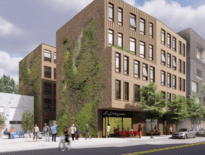The number of single-family houses and condominiums for sale in Massachusetts grew substantially in nearly all of the state’s major markets last month according to new data from the state’s regional real estate boards. But numbers of new listings single-family listings in the same month were down substantially compared to April 2019 before the COVID-19 pandemic.
The numbers could indicate that prospective home sellers are growing more comfortable with putting their homes on the market as the COVID-19 pandemic has eased. However, market-watchers say the intensity of demand is driving incredibly fast transaction cycles, keeping overall inventory available at any one time low.
“We’re continuing to have closed sales, and that this closed sales number is continuing to increase. An increase is a good thing because it shows people are comfortable listing their homes, and as the restrictions continue to ease, we’re optimistic that people will feel more comfortable to list and more comfortable to show, and that prospective buyers will be more comfortable attending showings,” said Massachusetts Association of Realtors 2021 President Steve Medieros.
Single-Family Listings
The Greater Boston Association of Realtors reported 1,083 single-family homes for sale in its territory, which largely covers the area within Route 128 along with many MetroWest communities. That represents a 48 percent increase over March, but a 52 percent drop over April 2019. And 1,981 new single-family listings hit the market last month in GBAR’s area, a 20 percent jump over March and nearly level with April 2019’s number.
Even steeper inventory shortages were seen on Cape Cod and the Islands, however. Only 519 single-family houses were for sale, a mere 12 percent increase over March and a 79 percent drop over April 2019. The Cape Cod & Islands Association of Realtors reported 619 new listings, a 17 percent increase over March but a 29 percent decrease over April 2019.
The Central Massachusetts Association of Realtors reported 430 single-family homes for sale, up 47 percent from March and down 60 percent from April. The number of new listings hit 786 in April, up 27 percent from March and down 10 percent from April 2019.
The Pioneer Valley Association of Realtors reported similar conditions: 453 single-family homes for sale, up 25 percent from March and down 62 percent from April 2019. The number of new listings hit 671 in April, up 28 percent from March and down 13 percent from April 2019.
Condo Listings
Conditions in condo markets were somewhat better, with overall inventory (1,981) in GBAR’s territory up 21 percent from March and up 4 percent from 2019. The number of new listings hit 2,080 in April, up 14 percent from March and 22 percent from April.
“As busy as the market has been, sales activity could have been even stronger if we had more product to sell,” GBAR President Dino Confalone, an agent with Gibson Sotheby’s International Realty in Cambridge, said in a statement. “Our listing inventory is down to less than two months’ supply for both single-family homes and condos, which makes it a good time sell as properties that are priced right are selling on average in three to four weeks’ time or less.”
On the Cape and the islands, the picture was bleaker. Only 193 condos were on the market in April, a 5 percent increase from March and a 69 percent decrease from April 2019. There were only 144 new listings, an 8 percent increase from March and a 39 percent drop from April 2019.
In Central Massachusetts, the number of condo listings hit 116, 21 percent up from March but 50 percent down from April 2019. There were 215 new listings, however, a 16 percent jump from March and a 25 percent jump from April 2019.
In the Pioneer Valley, 81 condos in the inventory, a 17 percent increase from the prior month and a 53 percent decline from April 2019, while 88 new units hit the market, a 2 percent increase from March and a 21 percent drop from April 2019.
Rapid Sales
The rapid clip of home sales – just seven days from listing to contract in the five-county Greater Boston area, according to a new Zillow report – is sending buyers into a frenzy.
“We have inventory coming on the market and going under contract within a week or so – it comes on but doesn’t stay on,” said MAR’s Medieros.
But with the impending end of Massachusetts’ COVID-19 restrictions and high – and rapidly rising – rate of COVID-19 vaccination among adults and teens, it’s a question whether more homes will hit the market.
“I think time will tell – it’s hard to tell what people will do, but our hope is it will make anyone hesitating to list their home consider doing so, as their options for sizing up or down are increasingly hitting the market, and that any buyers hesitating to start looking will jump in and take advantage of the low rates,” Medieros said.
Another factor: Some buyers may also give up.
“This spring’s market has been one the most intensely competitive we’ve ever seen,” GBAR’s Confalone said. “We think that should soften a bit in the months ahead though as inventory levels tend to rise leading into summer. We’ve also seen some buyers who’ve been unable to get an offer accepted drop out of the market to renew a lease, while others have been squeezed out as home prices and mortgage rates have risen since the start of the year, and that should open up more opportunities.”
The other looming question: Do these market conditions constitute a bubble risk? In a statement accompanying the release of Zillow’s latest market report, company economist Jeff Tucker said “no.”
“Both of these hot markets [the mid-2000s and today’s] saw extreme price appreciation in a relatively short period of time. But that’s where the similarities end,” Tucker said. “Unlike the combination of speculators and people spending beyond their means with non-traditional loans in 2004 and 2005, today’s homebuying demand is driven by well-qualified buyers locking in traditional, fixed-rate mortgages. Builders are firing on all cylinders to meet the excess demand brought by low mortgage rates and millions of Millennial buyers jockeying for limited homes, but after more than a decade of underbuilding, homes will remain scarce until existing homeowners feel more comfortable selling or prices rise enough to restore balance.”







